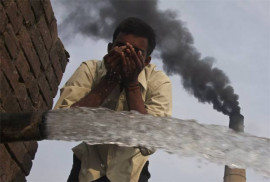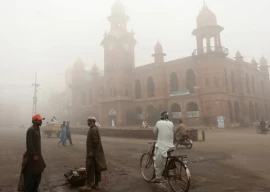
That, at least, was the gist of the proposals that were agreed upon at the Second Energy Conference convened by Prime Minister Yousaf Raza Gilani in Lahore on Monday, and attended by the four chief ministers, the federal ministers for water and power, petroleum, and finance along with prominent politicians and businessmen.
Though the prime minister said that some proposals would be discussed with stakeholders before being implemented, hardly any of the measures agreed upon were new. Switching government offices to two weekly holidays during the summer, and closing down commercial areas after 8pm except on Saturdays have both been tried. Increasing the level of consumption below which consumers are considered “lifeline” and pay a nominal sum – from 50 kilowatt-hours to 100 kWh – was clearly a populist step.
About the only measure that was substantive and new was the decision to equitably share the burden of power outages between the provinces, an announcement that delighted the host of the gathering, Punjab Chief Minister Shahbaz Sharif.
“This decision will not only bring relief to Punjab but will also strengthen the federation,” he said. “We [Punjab] will be happy to share resources as we did during the 7th National Finance Commission award.”
In recent weeks, Shahbaz had been publicly lambasting the federal government for the manner in which the energy crisis has affected Punjab, which he felt was discriminatory. Shahbaz will now be able to walk away with at least some measure of a political victory, though Punjab’s shuttered factories are still far from getting a regular power supply.
The prime minister, for his part, appeared keen to allay Punjab’s grievances. The decision to hold the conference in Lahore appears to be part of that thought process. “I understand that Punjab has suffered massively in the past but now we will encourage and help Punjab build power plants. I will personally direct federal resources to help Punjab in this regard,” Gilani said.
Yet while the politics seemed to be working out rather nicely, the economics was howling in agony as the country’s elected leaders, with apparently straight faces, asked the business community to close down retail markets at 8 pm, which is normally peak sales time. What impact this might have on the country’s gross domestic product was a question that went unasked.
The retail and wholesale sector constitutes roughly 20% of the total economy, and employs one in every ten Pakistanis.
Prime Minister Gilani claimed that this measure – along with the others – would shave close to 700 megawatts, or about 3.4% off the expected peak summer demand of around 20,000 megawatts. The peak shortfall is typically close to 30% of demand levels and can reach as high as 50%. Similar claims of savings have not panned out to be true in previous years.
It was perhaps recognising the limited success the government has had in the past that the prime minister said that the government would no longer be experimenting with daylight savings time and instead simply change summer office timings to save energy.
On the core issues of reducing theft, improving the fuel mix of the national grid to cheaper sources of energy, and improving the overall efficiency of the system, the political leadership was mostly silent.
The prime minister said that Punjab has announced that it would clear arrears owed to Pepco, and requested other provinces and federal departments to also follow suit soon as possible – but no concrete undertaking was agreed upon.
The prime minister mentioned that the government would encourage the installation of prepaid electricity meters to discourage theft, distribute energy-saving light-bulbs to reduce consumption and register cases against people caught stealing electricity.
To his credit, however, the prime minister did make one announcement that was bold, considering that he comes from the Pakistan Peoples Party, which has its political base in Sindh. He suggested that gas would soon be shared amongst the provinces in an equitable manner, too, just like electricity had been decided upon.
Sindh has 71% of the country’s gas production and has a constitutionally guaranteed “right of first use” on it. As a result, during peak demand for gas in the winter, Punjab faces gas rationing and also has less gas for its thermal power plants. Punjab has been demanding an NFC-like formula for the distribution of gas, but Sindh has thus far refused to budge. Prime Minister Gilani appears to have only floated the idea, since he gave no timelines of when he might be able to accomplish this.
The prime minister pointed out that the government had increased the national power generation capacity by 3,400 megawatts (or about 17%) during their four years in office. The annual rate of increase in the demand for power, however, has been – by the prime minister’s own admission – between 7% and 8%, meaning that the demand-supply gap has continued to worsen under the current administration.
Published in The Express Tribune, April 10th, 2012.
COMMENTS (25)
Comments are moderated and generally will be posted if they are on-topic and not abusive.
For more information, please see our Comments FAQ


1727177459-0/BeFunky-collage-(6)1727177459-0-165x106.webp)


1732697578-0/Untitled-design-(5)1732697578-0-270x192.webp)











@Muhammad: wellsaid...eitisalat is always above the law when it comes to taking the rights of its employees
There is no denying at all that these times are the most thorn-ridden times in the history of Pakistan, and its kind of miracle that Pakistan is still surviving and progressing. This is not happening at the auto-pilot and with any of the unseen miracle. This is all due to the tireless hard work of the Prime Minister Yousaf Raza Gilani under the shining and visionary leadership of President Asif Ali Zardari, the chief of Pakistan. Can anybody deny that despite all odds, the government had added 3,000 MW to theelectricity system? It’s a fact that not a single megawatt had been added to the national grid for decades, but the PPP government initiated short, medium and long-term power projects to end electricity shortage. The power crisis has not begun today, the country has been facing the problem since 1993. However, the then Prime Minister Mohtarma Benazir Bhutto Shaheed had realized the gravity of the problem and initiated projects of Independent Power Producers, which were criticized strongly by some elements. After her government, cases were registered against these IPPs and investors were put in jail which discouraged foreign investment in Pakistan. The Gilani government tried to introduce Rental Power Projects to bridge the gap between electricity demand and supply but media and judiciary again raised a hue and cry and approached court, thus obstructing power generation. Rest assured, the the government of PPP would overcome all problems with the help of political forces and people.
This act is unconstitutional. According to the constitution of Pakistan, the first right over the use of any resource is that of the producing province. Will some one challenge this in the supreme court.
@Truth_Prevails: This is what I am saying. Do research and then comment. Here is factual data for your information.According to Census of electricity undertaking conducted by FBS: Installed capacity of Punjab was of only 2.1 MW whereas Sindh had 213 MW, NWFP and Balochistan installed capacity share was 183 MW and 5 MW respectively. Average electricity generation in Sindh province was highest among other three provinces. In Punjab it was 269 min KWh which was 76 per cent less than Sindh where average generation was 1,154 min KWh against Punjab had 269 min KWh. Even generation in NWFP comparatively with Punjab was better by 72 per cent where its average was 962 min KWh. Balochistan has on average generated only 6 min KWh during last 10 years. Average energy consumption level in Punjab was 136 per cent higher than in Sindh where it was 439 rain KWh against 1,036 min KWh of Punjab. In NWFP average consumption was 213 min KWh and Balochistan had only 77 min KWh. Sindh has own natural gas, petrol resources and generates enough electricity for their people.
The energy prices (electricity tariff) should also be same all over the country. Cheap hydro-power capacity has been built up by country's resources and its benefits should be extended to the whole country. Why Karachi should have highest tariff in the country?
As a whole-saler/retailer myself, I think the markets closing down by 8pm is a very good step. People here start their days at noon and then go on to work till late at night. This does not increase productivity but only the electricity bills and consumption.
There will be no loss of GDP because of this as anyone who really wants/needs something, will ensure they get up early and buy whatever they have to within the scheduled business hours. It is like this in the developed countries and we should take a cue.
Nothing in this country is regulated. So because of whatever reasons, if the government (even though I may not agree with most of their policies/practices), has decided to take some logical action, it should be appreciated.
Resources should be distributed according to the contribution each city gives to the federation. Based on this, Karachi should be given priority followed by the next city that contributes be it Lahore Faisalabad etc. Its only fair that those who contribute most to the national exchequer receive the maximum benefit. Perhaps this will encourage other cities to pay taxes and other dues that they have taken for granted.
Oh well its all in news that they will share the load shedding.. Abbottabad city is facing too much load shedding.-- three hours continuous load shedding after every 2 hours has made our lives miserable.This conference was just another tea party held by PM & nothing more than that.
Unfortunately Pakistan found mostly insincere and dishonest leadership especially after 1971 after the partition of East Pakistan (currently Bangladesh) and West Pakistan and due to insincerity and dishonesty Pakistan's core and burning issues especially electricity have been ignored.You can't blame any single government for the energy crises but you can only say so that any government didn't take any practical steps to over come electricity crisis sincerely and honestly because the VVIP feeders were and are exempted from electricity load shedding from which electricity is provided to the leaders' offices and residences.
@Sindhvoice: Hey Bro, going by your formula KP should get most of the Electricity, then probably Punjab and then Sindh & Baluchistan. Do a bit of wiki research before putting up provoking ethnic slurs. Power production should be centralized and distributed as per needs accross the country. Its only about Pakistan & Paksitan only. I wish one day all provincial system is demolished and all districts are reclassified as States. No more Ethnic issues!!!
The mullahas and militants who generate so much hate and violence if used in place of furnace oil would generate so much electricity, that this problem in Pakistan shall be solved in no time.
Just across the border, Panjab electricity supply is 22 to 24 hrs in cities and 20 hrs in all villages. How come Pakistan mismanaged the most essential constituent of the national economy and general household need and didnt take any action for so many years ???
bismillahir rehmanir raheem asalamo alaykum wr wbr
I really appreciate the efforts put forward by the government to conserve our precious fuel and power resources. Government announced the policy of 2 weekly holidays which is indeed a very intelligent move to do saving of energy.It is done even in the developed countries where there is abundance of energy resources. I would like to draw your attention towards,PTCL ,which is the only department,where the Saturday holiday not observed.It is really a pity that PTCL is not participating in the effort for the progess of the country. PTCL is one of the largest organisation in Pakistan with about 35000employees and voilating the 2 days holiday policy means millions of rupess lost in the form of expenditure of energy by this huge organisation. All the rest of the departments,al private,semi government and government departments observed holiday on saturday but PTCL didn't announce holiday. I think government should have some control over the departments afterall thats what a government for
Credible solutions to power and energy shortage are best made by engineers - not politicians blowing out hot air and wasting everyone's time. If the engineers employed by the administration for dealing with this problem cannot come up with solutions, quite obviously they have not been selected on merit. People who do not deliver, should not be given responsibilities beyond their capabilities. They must either be transferred to the job for which they have the required skill set -- or sadly, fired and sent home. THERE IS NO OTHER WAY.
What should provinces share the shortage? According to which Law ?? If Sindh has additional electricity available, it needs to use for its own needs first. Punjab should generate their own electricity and it is provincial subject now. In the name of federation, no one has right to loot resources of any other provinces. However, if Sindh will ever have surplus electricity, it will happily share with their brothers in Punjab.
To preserve electricity, the light at the end of the tunnel has been switched of but the train is still coming.
"Forget about generation, lets conserve"; this is the conclusion our rulers have been able to arrive at through all energy conferences held over the past years. Interestingly every party is on-board in this consensus; PPP (Federal/Sindh/Balochistan), PML-N (Punjab), PML-Q (Federal/Sindh/Balochistan), ANP (KPK/Federal), JUI (Balochistan/Federal till last year), MQM (Sindh/Federal). Focus on CONSERVATION instead of GENERATION shows the planning sense & mettle of our decision-makers. No economy (Industrial + Agricultural + Commercial) can grow with such moves aimed at CONSERVATION that are not aided by any serious effort at GENERATION. Alas. How about "7-days holiday a week"? That will ensure 100% energy conservation. :P Pakistan "Khappay".
No light at end of tunnel?
Technologies: Pebble bed reactor Molten salt reactor Coal to diesel Fischer–Tropsch process Wind turbines made in Taxilla Gas turbines from Iran Coal based generation plants More dams
Financing: Friendly countries instead of usurious IMFs & World Banks. Pakistanis abroad. Iran, China, Russia, Malaysia, Singapore, Venezuela, etc. Debt moratorium on loans
There is so much light I can't see the tunnel. Of course Hillarys and World Banks wouldn't like it but national development is the only way forward. Only impediment is Pro-IMF finance ministry and Pro-US government.
.....Because of power shortages and prolonged load shedding, the light at the end of tunnel has been switched off.
Stay away from the tunnel as the incoming train has no head light either.
But there is a solution. Make incompetency and corruption punishable. I'm talking to the people of Pakistan, not the clowns sitting in power (no pun intended). Wake up!
gilani's picture seems photoshoped. Was he really there? Everything is possible in this fraudulent country of ours...
If we believe ourselves to be good citizens , then God given resources are the sacred property of Pakistan and they must be shared equally and without favour or prejudice. Raza Rabbani's 18th amendment failed to acknowledge this .
It's good this late realization at this every conference.